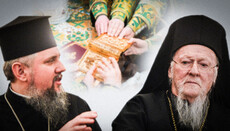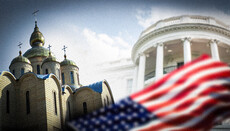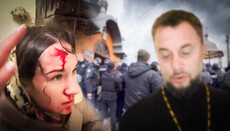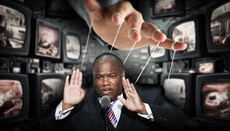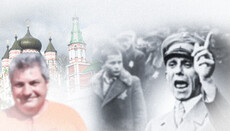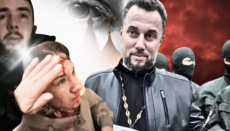Earthly or Heavenly Kingdom: What kind of patriotism does ROC head preach?
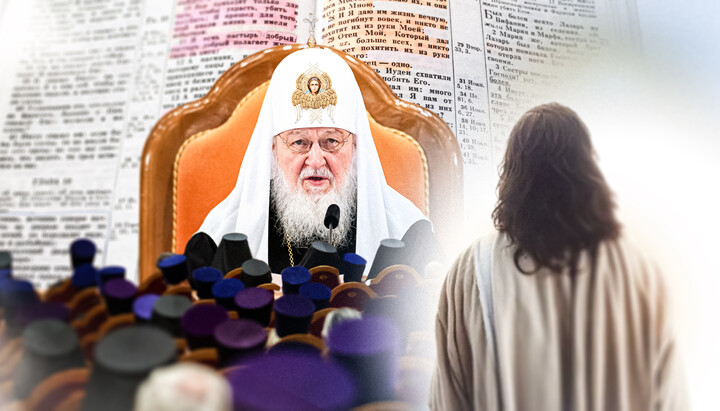
A revealing dialogue between the Patriarch of the Russian Orthodox Church and a priest took place at a meeting of Moscow clergy.
On February 11, 2025, at a gathering of the clergy of the Moscow Metropolis, an episode occurred that exposed a deep crisis within the Russian Orthodox Church.
Father Alexei Shliapin from Mozhaysk dared to say to the head of the ROC: "A priest should lead people to the Kingdom of Heaven, not engage in patriotism."
Patriarch Kirill’s response was telling: "Well, this is something! First time I've heard that! Father, are you by any chance from Western Ukraine?" He then added: "Go sit down and seriously think about the nonsense you just blurted out."
What is most shocking is the sarcastic tone the Patriarch used toward a fellow clergyman, being totally unbefitting for a Christian, let alone the First Hierarch of the biggest Orthodox Church. This style of communication bears little resemblance to the dialogue between two priests; instead, it resembles a superior humiliating a subordinate – no one likes being "taught" by a lower-ranked individual, especially in public.
Many will now argue (and some already do) that the Patriarch meant something else entirely, that he simply did not fully express his thoughts, and that Father Alexei Shliapin is merely a provocateur and a liberal (or a follower of Father Daniil Sysoev, which in today's Russia sounds like an insult). They will claim (and are already claiming) that the Patriarch responded correctly because patriotism is "everything for us", and that this is precisely how one should respond to those who question the necessity of preaching it.
However, the words and tone of the head of the ROC contrast so sharply with the Gospel message that all these arguments seem far from convincing.
This brief dialogue not only demonstrates intolerance of dissent but also reveals a substitution of Gospel values with the ideology of patriotism (read: the distorted concept of the "Russian World"), which calls into question the very essence of the Church’s mission.
The Patriarch vs. the Gospel: Pharisaism in the 21st century
Patriarch Kirill’s reaction to Father Alexei’s words resembles a classic example of spiritual Pharisaism. The Pharisees of Christ’s time – like the modern ideologues of the ROC – substituted faith with ritual and replaced love for God with nationalistic and patriotic fervor. They expected the Messiah to bring political liberation for Judea, not the salvation of souls. But Christ replied: "My Kingdom is not of this world" (John 18:36) – which was, in essence, one of the reasons He was crucified.
Today, the Patriarch, denouncing the "enemies of Russia" and calling patriotism a "sacred duty," repeats the same mistake: he places service to the state above service to God.
Consider Patriarch Kirill’s statement on patriotism from his book: "Defending the Motherland is the greatest duty."
Any Pharisee from Christ’s time would have agreed with these words, but Christ Himself called for loving one’s enemies (see Matthew 5:44).
The Church’s mission: The Kingdom of Heaven or patriotism?
Father Alexei Shliapin reminded everyone of the Church’s primary mission: "Repent, for the Kingdom of Heaven is at hand."
When Christ sent the apostles to preach the Gospel (see Mark 16:15), He did not mean the preaching of "patriotism" – He meant preaching the Kingdom of Heaven, which is within us.
All the Church Fathers, from John Chrysostom to Seraphim of Sarov, saw the goal of pastoral service as the salvation of souls, not the strengthening of state power.
Yet Patriarch Kirill, by demanding prayers for the authorities and justifying war as a "sacred act," transforms the Church into an ideological tool.
His claim that "patriotism is faithfulness to the divine plan" directly contradicts the Apostle Paul’s teaching: "Our citizenship is in heaven" (Philippians 3:20).
According to the Gospel, the Church is called to be the "salt of the earth" (see Matthew 5:13) – to preserve moral principles, even when they challenge authority.
However, according to Patriarch Kirill, the Church must "mobilize alongside the military", turning it into a participant in political conflicts rather than a spiritual force that rises above them.
Spiritual consequences: When faith becomes ideology
Patriarch Kirill has repeatedly stated that the "Russian World is a community of sanctuaries." However, in reality, these words conceal justification for war and the ideological foundation of everything the Russian Orthodox Church (ROC) has been doing. Because if Russia and Ukraine share the same sanctuaries, then it should be unacceptable to bomb them (of which there are numerous examples). And if such holy sites were destroyed, it would be appropriate to condemn this as unacceptable.
Did the Patriarch say anything about the destruction of the cathedral in Odesa? No.
Did he mention any of the hundreds of destroyed UOC churches? We haven’t heard him say a word in this regard.
On the other hand, the Patriarch’s words toward Father Alexei ("Are you by any chance from Western Ukraine?") indicate that he does not actually think in terms of shared sanctities – the very concept of the 'Russian World' that he claims to preach.
After all, in its classical definition, the 'Russian World' has no state borders. But in this case, it turns out that Orthodoxy in Western Ukraine differs from its Moscow counterpart – and this isn’t our claim, but that of the Patriarch himself.
If Orthodoxy is understood as the preaching of the Kingdom of Heaven, then yes, the Patriarch spoke the truth: in Western Ukraine, Orthodox Christians view the Church’s mission differently than in Russia.
The problem is bigger than one priest’s question
The entire situation with Father Alexei Shliapin’s question and the reaction from the Patriarch and the assembled clergy (laughter and applause in support of the ROC leader) is not just rudeness or arrogance – it is a symptom of a systemic problem.
In other words, the Patriarch’s position aligns with the majority of Moscow’s clergy, which is both frightening and disappointing. Of course, not all of them think this way, but… they supported the Patriarch’s words simply because they do not want to encounter 'certain authorities' or the anger of their ruling archbishop.
However, history has known people with dissenting views. Their spiritual feat was that they spoke what they believed – especially when their beliefs aligned with the Gospel.
It will suffice to recall Saint Philip of Moscow, whose memory is honored by the ROC. This pastor died denouncing the bloody tyranny of Tzar John the Terrible.
Yet Patriarch Kirill, while calling the war "fratricidal" and "internal strife," actively supports it – acting not as a pastor, but as a politician.
The Church at a crossroads
The Primate of the ROC essentially mocked a priest who reminded him of the Kingdom of Heaven.
Of course, one could interpret his words to mean that "a mere cleric should not lecture the Patriarch." But in that case, we would have expected the Patriarch himself to speak out against prioritizing earthly patriotism over heavenly truth.
But he did not.
And that is terrifying.
We do not know how things will unfold in the future, but it is already evident that Patriarch Kirill’s rhetoric is not only dividing nations but also splitting the Church itself – turning churches into instruments of propaganda rather than houses of God.
The Church’s mission is not to fight for the 'Russian World' (or for the Ukrainian one, or any other). Its task is to be the light of the world – even if that light burns and offends someone.
As Christians, we must "obey God rather than men" (Acts 5:29).
And as long as the Russian Ortodox Church under Patriarch Kirill's leadership chooses Caesar, it risks losing God.
